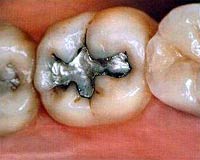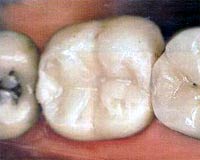| White
Filling
We can make your smile more beautiful with composite fillings.
In teeth in the front of your mouth as well as the back of your
mouth, white fillings are beautiful, safe and long lasting.
These before and after photographs show the results of replacement
of old amalgam fillings with composite fillings done in the mouth
on the same day.
In some larger fillings, a laboratory procedure is involved where
the filling is made by a technician and then placed by the dentist.We
will let you know what type of restoration would be right for you.
White Fillings
In the past, teeth were most commonly repaired with amalgam (silver)
fillings or gold restorations. Thanks to advances in modern dental
materials and techniques, teeth can be restored with a more aesthetic
and natural appearance. There are different types of cosmetic fillings
currently available. The type used will depend on the location of
the tooth and the amount of tooth structure that needs to be repaired.
Direct Composite
The most simple form of 'white filling' is technically called a
Composite. It is made up of a composite quartz resin and usually
contains some sort of light sensitive agent. These light cured composites
are extremely cosmetic and most often bonded into place in one appointment.
For this reason, they are often referred to as "bonding".
They can be used in both the front of the mouth as well as in your
back teeth. These materials come in a variety of shades so that
they will match the color of your own teeth. Some of these composite
materials have been specifically designed to actually withstand
the incredible forces you can exert when chewing on your back teeth.
In order to bond a filling material to your tooth it is first necessary
to remove decay, prepare the tooth and then to condition the enamel
and dentin. Once conditioned, a thin resin is applied which bonds
to the etched surface. The bond strength of these fillings is incredible.
Today we can bond plastics and even amalgam (silver fillings) to
your teeth. Bonding increases the strength of these restorations
far beyond those of only a short time ago.
After placement, composites are hardened by shining an intense
light on them for a specified period of time, usually around 40
seconds. Since we tend to look at this light all the time ( many
times a day) it is necessary for us to protect our eyes from it
with an orange shield. It is not necessary for us to protect your
eyes since you look at this light only once in a while. However,
it is probably a good idea for you not to look directly into the
light anyway. An ounce of prevention, is indeed, worth a pound of
cure!
Indirect Composite/Porcelain Inlays
The other type of 'white filling' is called a Composite or Porcelain
Inlay. These fillings are usually placed in back teeth where aesthetics
are the primary concern. In order to increase their strength and
longevity, they are fabricated in the laboratory and then bonded
into position in the surgery. This is a two visit procedure rather
than the one visit required to place a composite filling. However,
when it comes to strength and cosmetics, the extra time and expense
is well worth it! I hope that you now understand a little bit more
about white fillings.
 |
 |
| Old silver Filling |
Tooth Coloured Filling |
|


